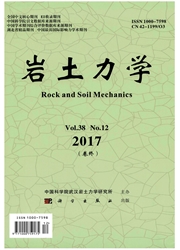

 中文摘要:
中文摘要:
为了预测滑坡地下水位并揭示其与气温、降雨以及库水位等变量间的动态响应关系,提出基于多变量混沌理论的粒子群-支持向量机(PSO-SVM)模型.该模型采用定性分析和灰关联定量分析法确定各因素对地下水位的作用关系并重构多变量相空间.利用SVM模型对每月监测地下水位值进行预测,并采用PSO算法克服SVM模型参数选取困难的缺点,最后对预测结果进行对比分析.以三峡库区白家包滑坡为例进行分析,并将分析结果与单变量PSO-SVM模型相比较,结果表明:多变量PSO-SVM模型的预测结果比较理想,精度高于单变量PSO-SVM模型,可以真实地反映地下水位系统发展演化的本质特征.
 英文摘要:
英文摘要:
A particle swarm optimization-support vector machine (PSO-SVM) model was introduced in order to forecast the groundwater level and reveal the dynamic response relationship between groundwater level and its impact factors. The PSO-SVM model was based on multivariate phase space reconstruction. The impact of various factors on the groundwater level was determined by qualitative analysis and grey relational analysis. The multivariate phase space reconstruction theory was applied to groundwater level time series and its influencing factors. The SVM model was established to predict the groundwater level, and PSO algorithm was used to select the optimal parameters of the SVM model. Finally, with Baijiabao landslide in the Three Geoger Reservoir, for example, the presented model was compared with the univariate PSO-SVM model. Results showed that the prediction accuracy of the proposed model was higher than that of the univariate PSO-SVM model. The proposed model can truly reflect the essential characteristics of groundwater level system evolution.
 同期刊论文项目
同期刊论文项目
 同项目期刊论文
同项目期刊论文
 期刊信息
期刊信息
